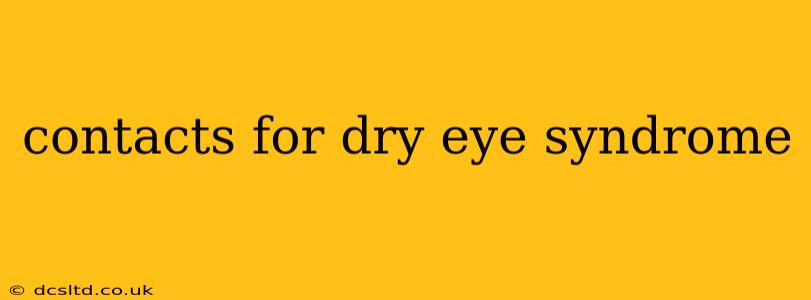Dry eye syndrome is a common condition affecting millions, causing discomfort, blurry vision, and even impacting daily life. For contact lens wearers, the challenges are amplified. But don't despair! Many options exist to manage dry eyes while still enjoying the convenience of contact lenses. This guide explores the various contact lens types and solutions available for those with dry eye syndrome.
What Types of Contact Lenses Are Best for Dry Eyes?
This is a crucial question for anyone with dry eye syndrome considering contact lenses. The good news is that advancements in contact lens technology have produced options specifically designed to minimize dryness and discomfort.
-
Daily Disposable Lenses: These lenses are a popular choice for dry eye sufferers. Because they are replaced daily, there's no buildup of debris or protein deposits that can irritate the eyes. This minimizes the chances of inflammation and dryness. Brands like 1-DAY ACUVUE MOIST and Biotrue ONEday are frequently recommended for their high moisture content.
-
Silicone Hydrogel Lenses: These lenses allow significantly more oxygen to reach the cornea compared to traditional hydrogel lenses. Increased oxygen permeability helps to maintain a healthier tear film and reduces the risk of dryness and irritation. Many silicone hydrogel lenses are designed with moisturizing agents for added comfort. Examples include Acuvue Oasys and Air Optix Aqua.
-
Large Diameter Lenses: These lenses distribute the tear film over a larger area, potentially reducing the feeling of dryness. However, this is not a universally effective approach, and individual results vary.
Can I Still Wear My Current Contacts if I Have Dry Eye?
Whether you can continue wearing your current contacts depends on several factors. The severity of your dry eye, the type of contact lens you currently use, and your overall eye health all play a significant role. It's crucial to consult your eye doctor. They can assess your specific situation and recommend the best course of action. Continuing to wear unsuitable contacts can exacerbate dry eye symptoms and potentially lead to more serious eye problems.
What About Contact Lens Solutions for Dry Eyes?
The type of contact lens solution you use is also critical in managing dry eyes. Look for solutions with added moisturizers or those specifically designed for dry eye sufferers. Some solutions contain hyaluronic acid or other ingredients to help retain moisture and lubricate the eyes. Your eye doctor can advise you on which solution is best suited to your needs and lens type.
Are There Any Specific Brands of Contact Lenses for Dry Eyes?
Several brands focus on creating lenses for individuals with dry eye syndrome. As mentioned before, Acuvue Oasys, Air Optix Aqua, 1-DAY ACUVUE MOIST, and Biotrue ONEday are frequently cited for their suitability. However, the best brand for you will depend on your individual needs and eye health. Your eye doctor can provide personalized recommendations based on your specific condition.
What Are the Symptoms of Dry Eye When Wearing Contacts?
Recognizing the signs of dry eye when wearing contacts is essential for timely intervention. Common symptoms include:
- Burning or stinging sensations
- Itching
- Blurred vision, especially towards the end of the day
- Feeling of something in the eye
- Excessive tearing (ironically, dry eyes can sometimes lead to increased tearing as the eyes try to compensate for lack of moisture)
- Sensitivity to light
How Can I Prevent Dry Eye While Wearing Contacts?
Preventing dry eye when wearing contacts involves a multi-pronged approach:
- Follow your eye doctor's recommendations: This includes proper lens care, cleaning, and replacement schedules.
- Use appropriate contact lens solutions: Choose solutions designed to hydrate and lubricate.
- Take regular breaks from wearing contacts: Give your eyes a rest periodically, especially if you experience discomfort.
- Blink frequently: Consciously remind yourself to blink regularly, especially when focusing on screens.
- Stay hydrated: Drink plenty of water throughout the day to keep your body and eyes properly hydrated.
- Maintain a healthy lifestyle: A balanced diet and sufficient sleep can also contribute to healthier eyes.
Remember: This information is for general knowledge and should not be considered medical advice. Always consult your eye doctor for personalized recommendations and to address any concerns regarding dry eye and contact lens wear. They can perform a comprehensive eye exam to determine the severity of your dry eye and recommend the most suitable contact lenses and solutions for your specific needs.
